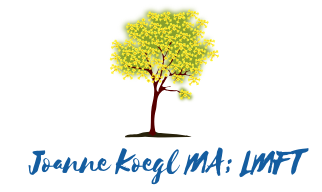When Life Changes Without Your Permission
There are moments in life when change comes knocking — sometimes gently, and sometimes like a storm.
I’ve been thinking about this a lot, especially with so many of my clients having lost their homes in the Altadena and Palisades fires. It’s been ten months now, and the emotional toll is showing up in new ways.
Their stories have led me to reflect on two pivotal life transitions of my own — when my young husband died suddenly in a car accident in 1999, and when my mom, brother, and aunt all passed from COVID, two weeks apart, in 2020.
In both seasons, I felt numb, but the lessons were different.
When I lost my husband, I was a young widow without peers who understood. I withdrew from friends who didn’t know what to say. It became a time of deep self-reflection and growth. I knew I would never again be the Joanne I was before. Yet, in time, I realized that didn’t mean I couldn’t become an even better version of myself.
Through solitude, I learned compassion for others, gratitude for life, and most importantly, compassion for myself. I stopped trying to be “superwoman” at the expense of my own wellbeing and began aligning with what truly mattered.
When my mother, brother, and aunt died in 2020, it was another period of reflection — but this time, my inner child needed nurturing. I was no longer a daughter or niece; I was part of the older generation. Journaling, grief therapy, and connection with friends became lifelines. I practiced listening to my needs and offering myself grace.
Major transitions always change us, but I’ve learned that we can emerge wiser and more grounded.
The Empty Nest — and the Space It Opens
For many women, the empty nest brings both pride and grief. Years of nurturing others shift overnight into silence. It’s not always depression — sometimes it’s an identity recalibration.
In therapy, I’ve seen women move from “I don’t know what to do with myself” to “I finally have time to discover who I am.”
Grief isn’t just for death; it’s for every version of yourself you’ve had to let go. Research from the Harvard Study of Adult Development shows that reflection, connection, and creative engagement during these transitions often lead to higher long-term wellbeing.
Losses Beyond the Nest
The loss of a spouse, home, or financial security can dismantle one’s sense of safety — yet it also invites a spiritual reckoning. Often people are going through multiple losses. I have clients that lost their home to the fire and at the same time have elder parents and have children leaving for college. It’s a lot to handle and what would you tell a love one going through so much?
As Brené Brown writes,
“Owning our story and loving ourselves through that process is the bravest thing that we will ever do.”
Courage means allowing ourselves to feel deeply while trusting that new meaning will eventually emerge.
How We Recreate Ourselves
Healing through transition involves three stages:
Letting Go — honoring what has been lost.
Re-evaluating — asking, “What do I value now?”
Re-imagining — experimenting with new roles, friendships, or routines.
Some of my client’s rediscover joy through volunteering, art, or travel. Others find peace in journaling, gardening, or spiritual practices.
A study in The Journal of Positive Psychology found that people who meet change with curiosity instead of fear experience greater post-traumatic growth — expanding empathy, resilience, and wisdom.
How Men and Women Differ
Both men and women experience reinvention, but often in distinct ways.
Women process through connection and introspection, redefining identity beyond family roles.
Men may focus on purpose and productivity, finding meaning through achievement.
Neither path is better — healing comes from balancing both reflection and action.
Embracing the Change
Life transitions aren’t “midlife crises.” They’re crossroads — invitations to shed outdated versions of ourselves and step into something truer.
C.S. Lewis once said,
“You can’t go back and change the beginning, but you can start where you are and change the ending.”
Therapy can be a space to grieve, reimagine, and rebuild — turning loss into growth and uncertainty into renewal.
✨ Closing Thought
“Sometimes you have to let go of the picture of what you thought life would be like and learn to find joy in the story you are actually living.” – Mel Robbins
If you’re navigating change or loss, remember — you’re not meant to go back to who you were. You’re becoming someone new, and that’s where healing begins. You do not need to go this alone, turn to a therapist that has been there and can help guide you into your new transition.



